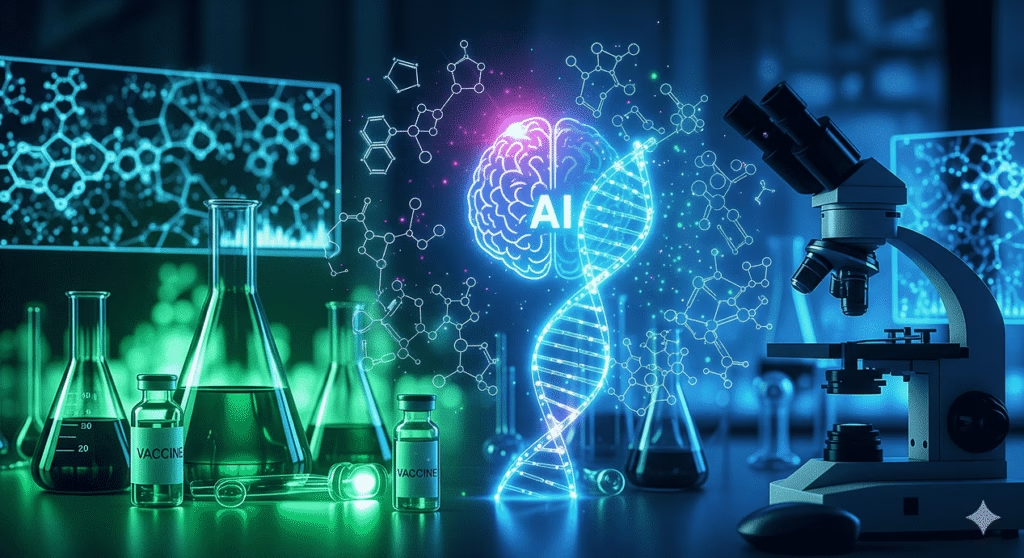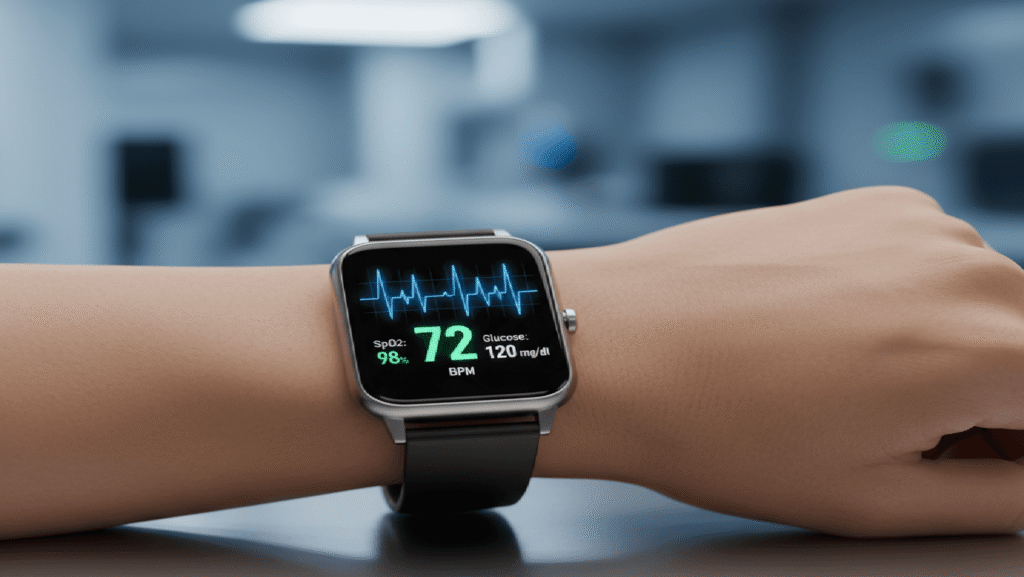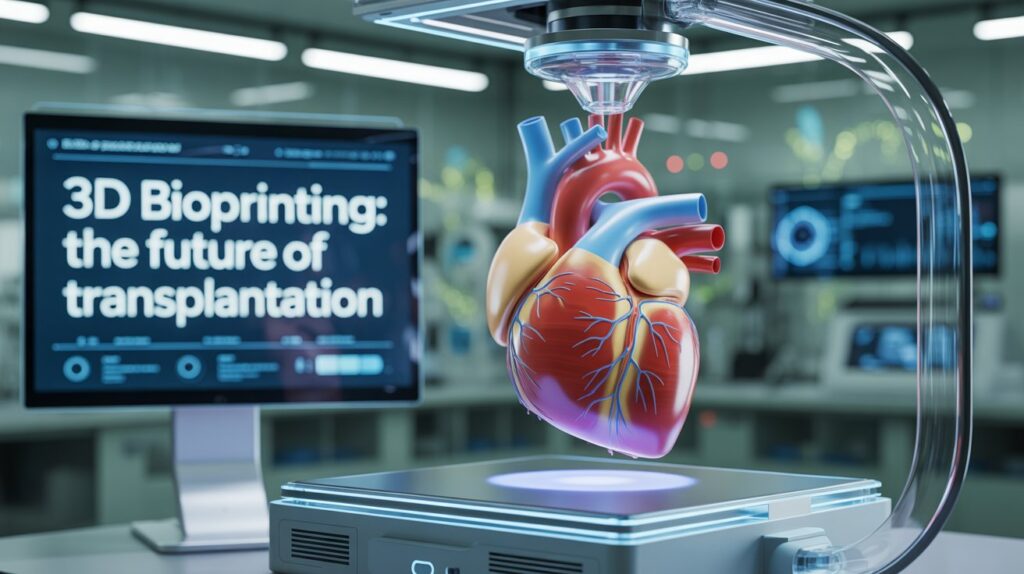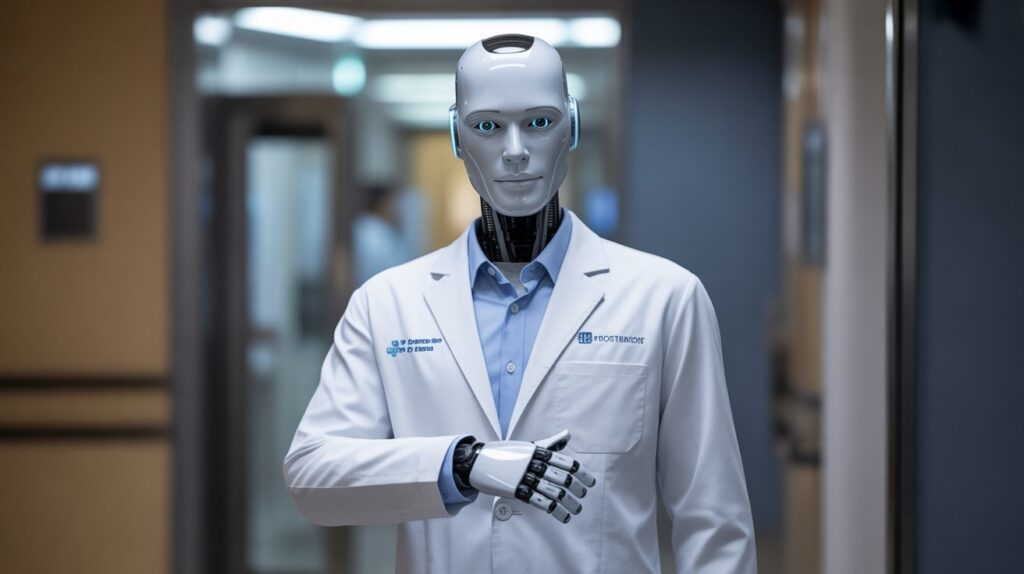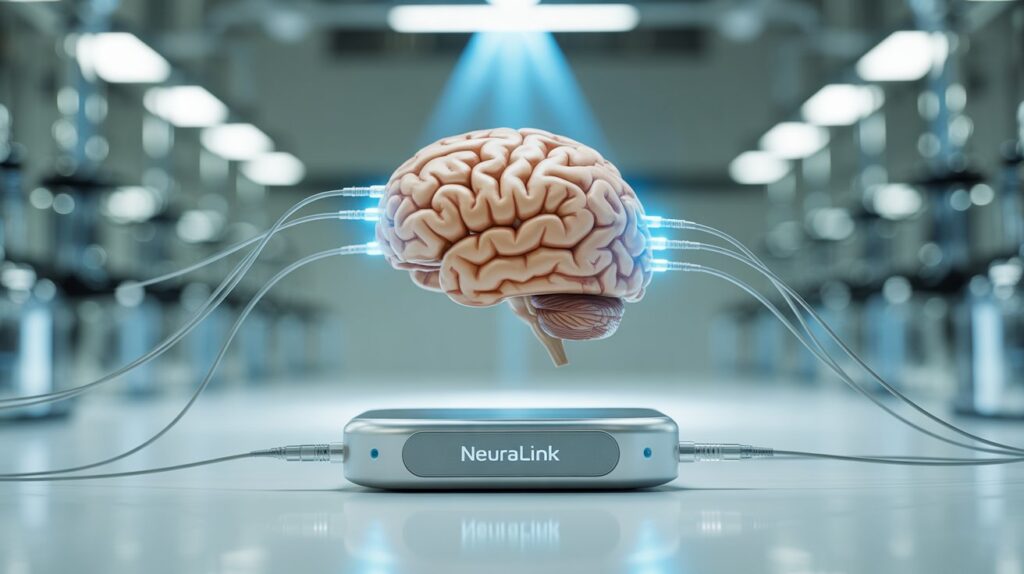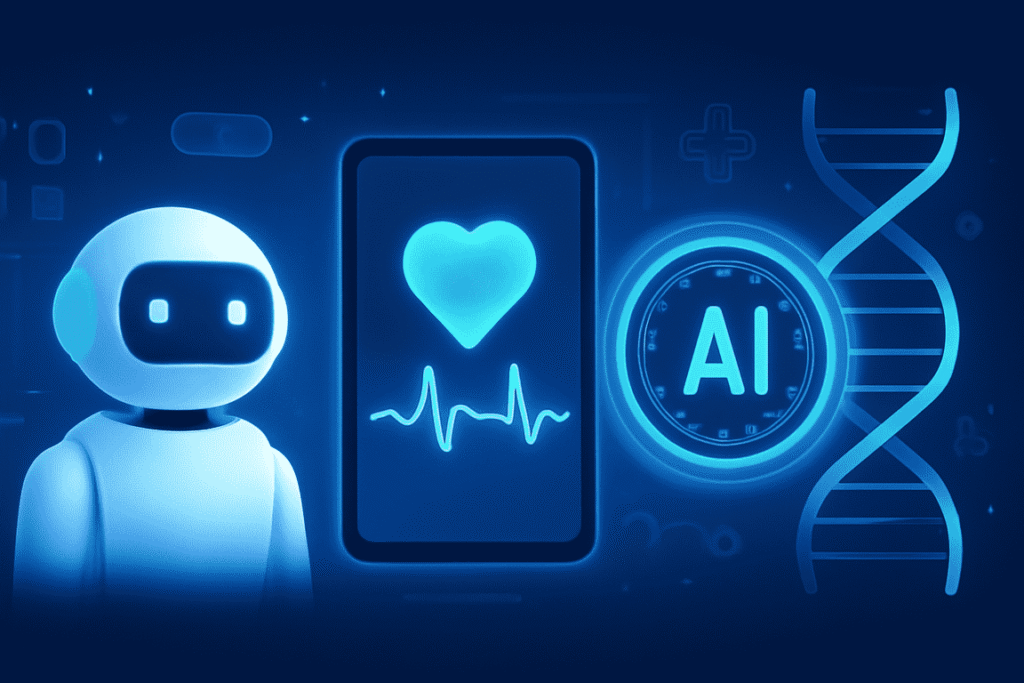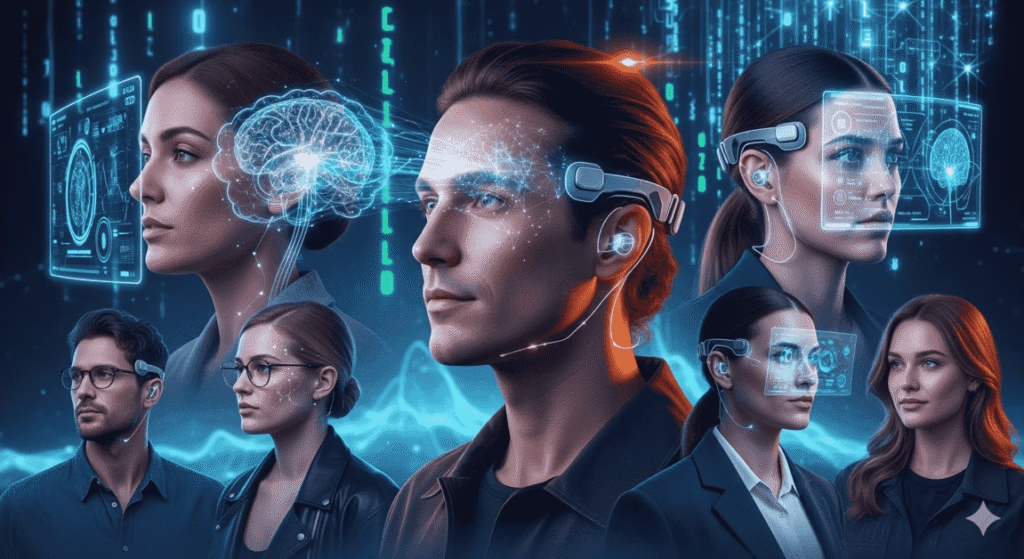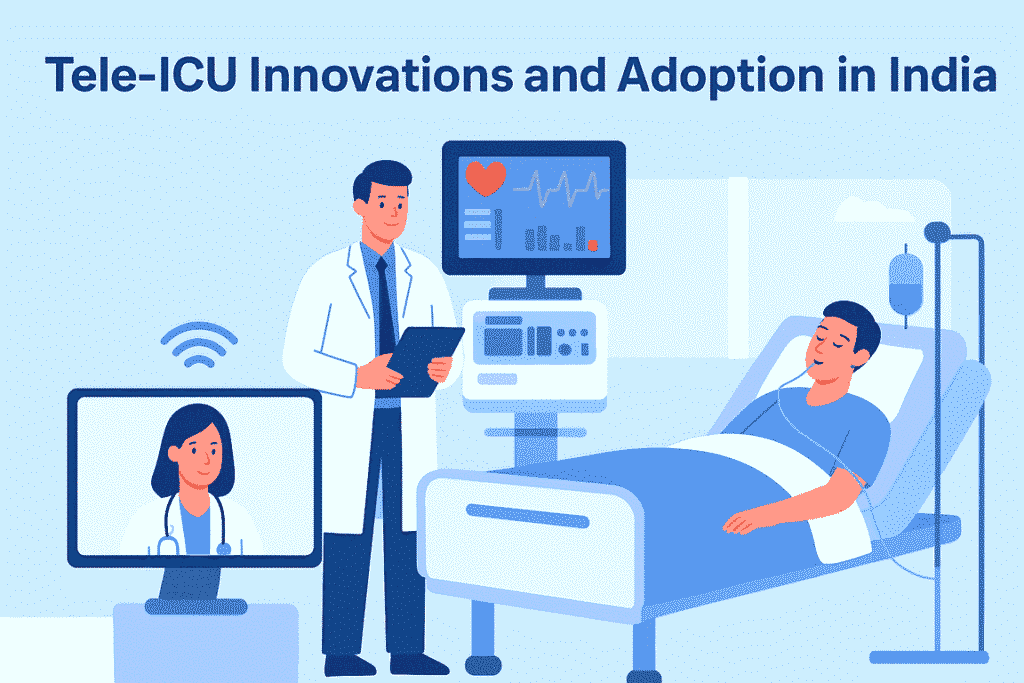💡 Imagine a world where new medicines and life-saving vaccines are developed not in decades, but in months. A world where diseases are outsmarted by algorithms that can predict their every move. This isn’t science fiction; it’s the new reality being shaped by Artificial Intelligence (AI).
From tackling global pandemics to personalizing cancer therapies, AI drug discovery and AI vaccines are revolutionizing how we create treatments—making the process faster, cheaper, and more effective than ever before.
🧪 From Test Tubes to Terabytes: The Old Way vs. The New
Traditionally, discovering a new drug was like searching for a needle in a haystack. Scientists had to manually test thousands of chemical compounds—a process that often took over a decade, cost billions of dollars, and still carried a high risk of failure.
⚡ Now, AI has changed the game.
AI algorithms can sift through massive genetic databases, chemical libraries, and clinical data in a fraction of the time. Think of it as a super-powered detective that:
- Identifies the most promising compounds
- Predicts how they will behave in the human body
- Designs entirely new molecules from scratch
This shift dramatically speeds up the initial discovery phase and allows scientists to focus their efforts where success is most likely.
📊 Traditional Drug Discovery Timeline vs AI-Accelerated Timeline
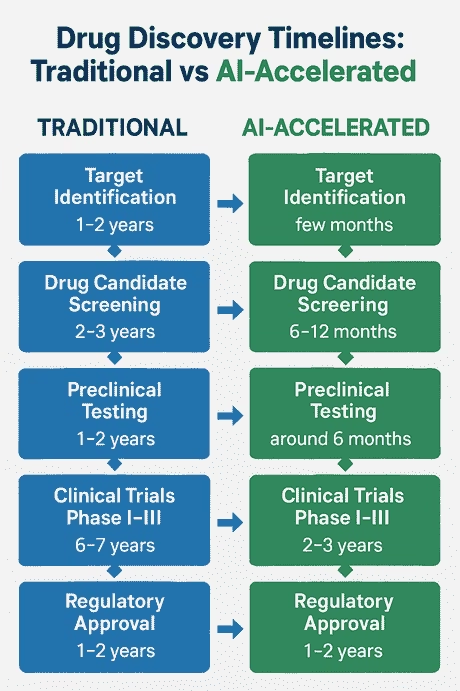
🚀 How AI is Supercharging Drug and Vaccine Development
AI’s impact is being felt across the entire development pipeline:
🎯 Identifying New Targets
AI analyzes biological data to pinpoint disease-causing genes or proteins, giving researchers precise targets to attack.
🧬 Designing Smarter Drugs
Instead of relying on trial-and-error, AI designs molecules with the right shape and chemical properties—boosting effectiveness and reducing side effects.
🔮 Predicting Success Early
AI models simulate how a drug interacts with the human body. This “fail fast, fail cheap” approach weeds out risky compounds before expensive lab and clinical trials.
👩⚕️ Accelerating Clinical Trials
AI helps match the right patients to the right trial, monitors progress in real time, and analyzes results faster and more accurately.
💉 Case Study: AI and COVID-19 Vaccines
During the pandemic, AI analyzed the virus’s genetic code and quickly identified the spike protein as the key target. This insight accelerated the creation of mRNA vaccines that saved millions of lives.
📊Applications of AI in Vaccine Development
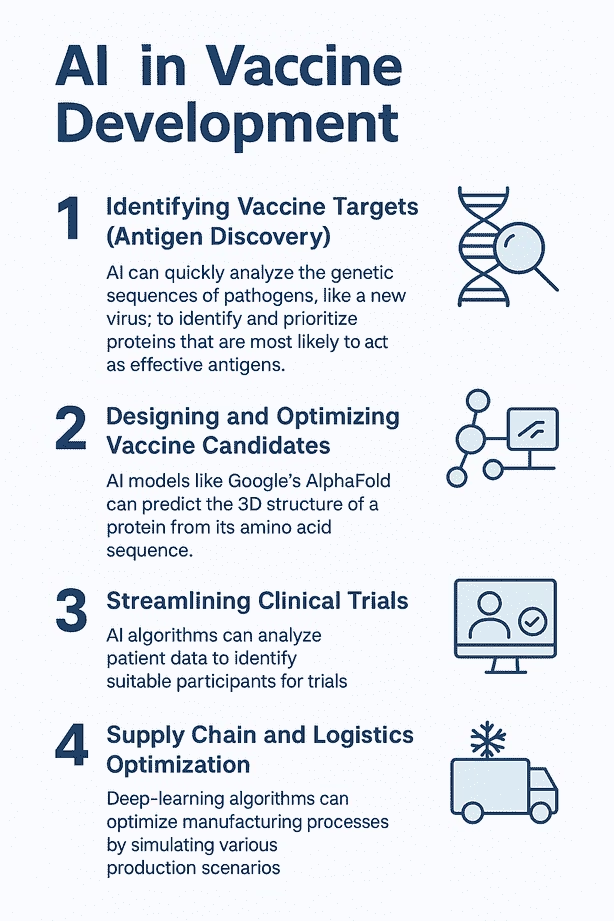
🌍 The Future of AI in Medicine: Personalized and Predictive
The most exciting frontier for AI in medicine is personalized treatment. Soon, AI could analyze your unique:
- Genetic makeup
- Lifestyle habits
- Medical history
…to design drugs and vaccines tailored specifically for you. That means more effective treatments for cancer, Alzheimer’s, and diabetes—with fewer side effects.
Equally powerful is AI’s role in predictive healthcare. By scanning population-level health data, AI can:
- Detect emerging disease hotspots
- Predict future pandemics
- Guide proactive responses before outbreaks spiral
📊 AI Personalized Medicine
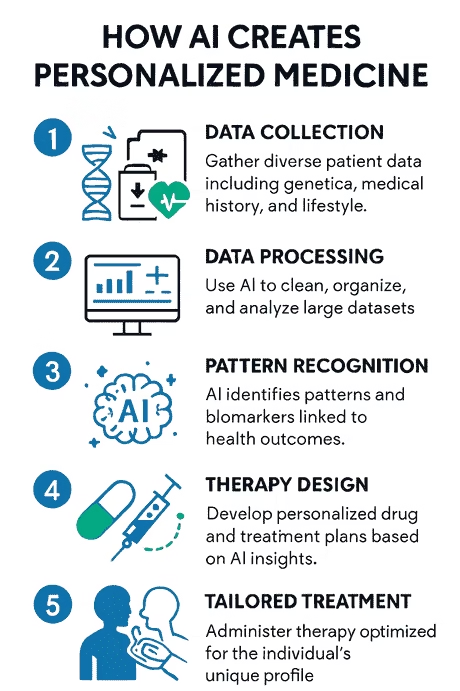
⚠️ Challenges on the Road Ahead
Despite its promise, AI in drug discovery and vaccines faces hurdles:
- Data Quality & Privacy – Biased or incomplete data can lead to flawed results. Protecting patient privacy is critical.
- Ethical Concerns – Responsible AI use must balance innovation with fairness, safety, and transparency.
- Validation – AI predictions must still be confirmed in real-world labs and trials.
✅ Conclusion: The New Architect of Modern Medicine
AI is no longer just a buzzword—it’s a fundamental tool reshaping healthcare. By combining human expertise with machine intelligence, we are entering a new era of medical breakthroughs.
AI drug discovery and AI vaccines are not replacing scientists—they are empowering them to work smarter, faster, and more effectively. The result? Better medicines, faster cures, and a healthier world.
📹 For a deeper dive, watch this video:
🔑 Key Takeaways
- AI drug discovery accelerates timelines from decades to months
- AI vaccines helped fast-track COVID-19 solutions
- Personalized medicine powered by AI will reduce side effects and improve outcomes
- Challenges remain, but momentum is undeniable
As artificial intelligence reshapes the future of drug and vaccine development, technology is also transforming how we treat and communicate with patients in real time. For a closer look at another cutting-edge field—where thoughts control machines and restore lost abilities—read our in-depth guide on Brain-Computer Interface Applications in Healthcare. Discover how direct brain-to-device connections are helping paralyzed patients communicate, rehabilitating stroke survivors, and even enhancing cognitive functions—ushering in a new era of neurotechnology-enabled care.
FAQs
How does AI speed up drug discovery?
AI analyzes vast amounts of biological and chemical data to identify potential drug candidates much faster than traditional methods. By automating tasks like screening molecules, predicting drug interactions, and optimizing clinical trial designs, AI can compress a process that used to take 10–15 years down to just months in some cases. For example, AI-designed drugs have entered clinical trials in as little as one year, compared to the usual four to five years with traditional techniques.
What are the main benefits of using AI in drug and vaccine development?
Faster discovery: AI drastically shortens the time from target identification to clinical trials.
Lower costs: By predicting which candidates are likely to fail early, AI reduces wasted resources.
Higher success rates: AI-designed molecules have shown up to 80–90% success in early (Phase I) clinical trials, compared to 40–65% for traditionally developed drugs.
Personalized medicine: AI can tailor treatments based on an individual’s genetic makeup, lifestyle, and health history.
Pandemic response: During COVID-19, AI helped rapidly identify the spike protein as a vaccine target, accelerating development for the first mRNA vaccines.
What types of AI are used in drug discovery?
Machine learning, deep learning, natural language processing, and generative AI are all commonly used to analyze data, predict drug properties, design new molecules, and optimize clinical trials.
Can AI predict side effects and drug interactions?
Yes, AI models can analyze how drugs behave in the body and predict potential side effects or interactions with other medications, helping researchers identify and avoid unsafe candidates early in the development process.
Is AI already being used by major pharmaceutical companies?
Absolutely. Most large pharma companies now partner with AI firms or have in-house AI teams. Startups like Insilico Medicine, Exscientia, BenevolentAI, Atomwise, Galixir, Ailynix, Helical, and Revivemed are involved in developing AI-designed drugs for clinical use.
How does AI help create personalized medicine?
AI analyzes a patient’s genetic, lifestyle, and medical data to recommend or even design treatments tailored to their unique needs. This is especially promising for diseases like cancer, where treatments can be highly individualized.
Are there any real-world examples of AI-designed drugs or vaccines?
Yes. For example, Exscientia’s AI-designed cancer drug entered clinical trials in just one year. In vaccines, various AI platforms were used to identify antigens and optimize formulations during the COVID-19 pandemic.
In 2019 researchers at MIT used Deep learning Model to screen vast libraries of compounds, identifying Halicin for its unexpected antibacterial activity.
What Happens When AI Finds a Drug Candidate That Humans Don’t Understand?
AI can identify promising drug candidates by detecting patterns invisible to human researchers.
But what if an AI model proposes a molecule that works—but no one understands why it works or how it interacts with the body at a fundamental level? This ‘black box’ scenario raises unique challenges for regulatory approval, patient safety, and scientific progress.
Will regulators accept AI-optimized drugs with incomplete mechanistic understanding and how will physicians explain treatment options to patients when the science behind them is opaque, is something experts need to think about.
If AI designs a vaccine or drug that fails in real-world use, who is held responsible—the developers, the pharma company, or the AI itself?
As AI plays a bigger role in designing medicines, questions about liability and accountability are inevitable. If a patient is harmed by a treatment created largely by AI, who should answer for it—the human scientists who deployed the AI, the company that owns the AI platform, or the technology itself? This is especially relevant as the line blurs between human-led and machine-driven innovation, and as regulatory agencies worldwide grapple with how to assign responsibility for AI-generated medical products.

